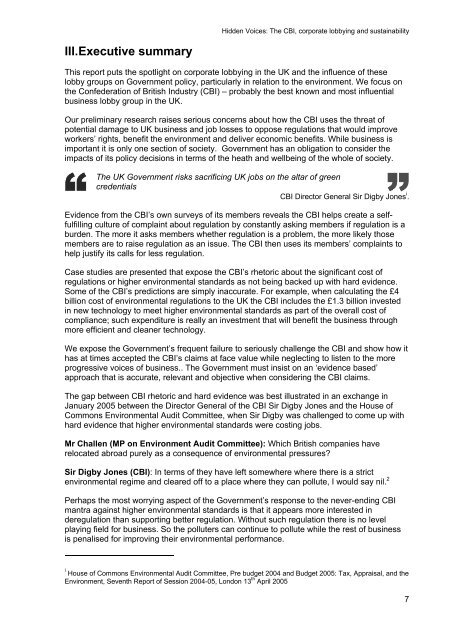hidden_voices
hidden_voices
hidden_voices
You also want an ePaper? Increase the reach of your titles
YUMPU automatically turns print PDFs into web optimized ePapers that Google loves.
Hidden Voices: The CBI, corporate lobbying and sustainabilityIII. Executive summaryThis report puts the spotlight on corporate lobbying in the UK and the influence of theselobby groups on Government policy, particularly in relation to the environment. We focus onthe Confederation of British Industry (CBI) – probably the best known and most influentialbusiness lobby group in the UK.Our preliminary research raises serious concerns about how the CBI uses the threat ofpotential damage to UK business and job losses to oppose regulations that would improveworkers’ rights, benefit the environment and deliver economic benefits. While business isimportant it is only one section of society. Government has an obligation to consider theimpacts of its policy decisions in terms of the heath and wellbeing of the whole of society.The UK Government risks sacrificing UK jobs on the altar of greencredentialsCBI Director General Sir Digby Jones i .Evidence from the CBI’s own surveys of its members reveals the CBI helps create a selffulfillingculture of complaint about regulation by constantly asking members if regulation is aburden. The more it asks members whether regulation is a problem, the more likely thosemembers are to raise regulation as an issue. The CBI then uses its members’ complaints tohelp justify its calls for less regulation.Case studies are presented that expose the CBI’s rhetoric about the significant cost ofregulations or higher environmental standards as not being backed up with hard evidence.Some of the CBI’s predictions are simply inaccurate. For example, when calculating the £4billion cost of environmental regulations to the UK the CBI includes the £1.3 billion investedin new technology to meet higher environmental standards as part of the overall cost ofcompliance; such expenditure is really an investment that will benefit the business throughmore efficient and cleaner technology.We expose the Government’s frequent failure to seriously challenge the CBI and show how ithas at times accepted the CBI’s claims at face value while neglecting to listen to the moreprogressive <strong>voices</strong> of business.. The Government must insist on an ‘evidence based’approach that is accurate, relevant and objective when considering the CBI claims.The gap between CBI rhetoric and hard evidence was best illustrated in an exchange inJanuary 2005 between the Director General of the CBI Sir Digby Jones and the House ofCommons Environmental Audit Committee, when Sir Digby was challenged to come up withhard evidence that higher environmental standards were costing jobs.Mr Challen (MP on Environment Audit Committee): Which British companies haverelocated abroad purely as a consequence of environmental pressures?Sir Digby Jones (CBI): In terms of they have left somewhere where there is a strictenvironmental regime and cleared off to a place where they can pollute, I would say nil. 2Perhaps the most worrying aspect of the Government’s response to the never-ending CBImantra against higher environmental standards is that it appears more interested inderegulation than supporting better regulation. Without such regulation there is no levelplaying field for business. So the polluters can continue to pollute while the rest of businessis penalised for improving their environmental performance.i House of Commons Environmental Audit Committee, Pre budget 2004 and Budget 2005: Tax, Appraisal, and theEnvironment, Seventh Report of Session 2004-05, London 13 th April 20057


